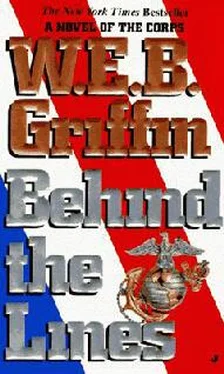W.E.B. Griffin - The Corps VII - Behind the Lines
Здесь есть возможность читать онлайн «W.E.B. Griffin - The Corps VII - Behind the Lines» весь текст электронной книги совершенно бесплатно (целиком полную версию без сокращений). В некоторых случаях можно слушать аудио, скачать через торрент в формате fb2 и присутствует краткое содержание. Жанр: prose_military, на английском языке. Описание произведения, (предисловие) а так же отзывы посетителей доступны на портале библиотеки ЛибКат.
- Название:The Corps VII - Behind the Lines
- Автор:
- Жанр:
- Год:неизвестен
- ISBN:нет данных
- Рейтинг книги:3 / 5. Голосов: 1
-
Избранное:Добавить в избранное
- Отзывы:
-
Ваша оценка:
- 60
- 1
- 2
- 3
- 4
- 5
The Corps VII - Behind the Lines: краткое содержание, описание и аннотация
Предлагаем к чтению аннотацию, описание, краткое содержание или предисловие (зависит от того, что написал сам автор книги «The Corps VII - Behind the Lines»). Если вы не нашли необходимую информацию о книге — напишите в комментариях, мы постараемся отыскать её.
The Corps VII - Behind the Lines — читать онлайн бесплатно полную книгу (весь текст) целиком
Ниже представлен текст книги, разбитый по страницам. Система сохранения места последней прочитанной страницы, позволяет с удобством читать онлайн бесплатно книгу «The Corps VII - Behind the Lines», без необходимости каждый раз заново искать на чём Вы остановились. Поставьте закладку, и сможете в любой момент перейти на страницу, на которой закончили чтение.
Интервал:
Закладка:
If he had done something official, the question could very well have been raised, "Who is Lieutenant Macklin"? His service records would have proba-bly been examined. And they contained, of course, Banning's efficiency re-port. Until his performance of duty proved how unjust it was, the less frequently that efficiency report came to light, of course, the better.
And, of course, as an officer and a gentleman, it was beneath him to bear Killer McCoy any ill will. It wasn't, in the final analysis, McCoy's fault that he was in Officer Candidate School. Banning had arranged for that, written him an absolutely unbelievable letter of recommendation.
McCoy belonged in the ranks. In time, under the leadership of other offi-cers, he would probably become a decent sergeant. So the thing to do was to get him back to the ranks. Failing to make it through Officer Candidate School, with his background, was to be expected.
At the Club, he spoke to one of McCoy's tactical officers. Without getting into specifics, he made it quite clear that commissioning Killer McCoy would be a disaster. That officer also believed it ill-advised at the very least to com-mission a high-school graduate; and he seemed sympathetic to the idea of re-turning McCoy to the ranks by seeing that he failed Officer Candidate School, if not academically, then in the areas of "potential leadership" and "charac-ter."
That probably would have worked. However, at the time it seemed a good idea that there be some failure on McCoy's part on the military aspects of the course. Arranging for McCoy to fail the course's marksmanship requirements seemed a good way to do that.
Such a failure would do McCoy no lasting harm. As soon as he was back in the ranks, he would be given the opportunity to refire the standard course, and he could probably do that. In the meantime, he would be dropped from Officer Candidate School.
But the Post Sergeant Major put his nose in where it properly had no place and challenged McCoy's rifle range scores. McCoy fired again for record, and qualified as High Expert.
Shortly afterward, Macklin was called into the office of Deputy School Commandant, where he was told it would be in his best interests to apply for a transfer. There was no question in Macklin's mind that the Sergeant Major had gone to the Deputy Commandant, carrying tales about what he thought Mack-lin had been doing in the rifle range butts.
His application for parachute duty was quickly approved. And from there things moved quickly. First, they grew worse with the transfer to the Pacific and the invasion of Guadalcanal. It was only by the grace of God that he wasn't killed during the invasion. Quite literally, he missed death by inches.
But then, in the hospital in Australia where he was sent for treatment of his wounds, things started to get better. He was selected to participate in the First War Bond Tour, as a wounded Guadalcanal veteran. He did so well dealing with the public that on the completion of Tour I, the public relations people asked that he be permanently assigned to supervise Tour II.
The Marines sent on Tour II to encourage the civilian population to buy more war bonds and raise civilian morale were Guadalcanal aviation aces, pi-lots who had shot down at least five Japanese aircraft. But Macklin did not find these men impressive. He privately decided that most of them were disgraces to the Marine uniforms they wore-they were undisciplined, regarded military courtesy as a joke, and spent most of the tour making unwanted advances to women and drinking themselves into oblivion-and that aviators themselves were highly overrated.
It was one thing to get out of a clean bed and climb into an airplane and fly for several hours, and then possibly-but only possibly-engage in a minute or two of combat, before flying home to a hot meal and a dry bed. It was quite another to do what he had done-or would have done had he not been wounded in the opening minutes of the assault-to make an assault in a land-ing barge through heavy fire onto an enemy-held beach, to hear the crack of machine-gun fire and the scream of incoming artillery, and then to be called upon to lead men against a determined enemy.
Those introspections had caused him to consider what would happen to him when Tour II was over. Thanks to that damned efficiency report, he was still a first lieutenant. In The Corps, first lieutenants command platoons. While he would of course go where he was sent, and do what he was told to do, the idea of commanding a platoon in the assault of some hostile shore seemed a waste of his professional talents and experience.
He should be a teacher. He had been there. He could make a genuine con-tribution to The Corps, and probably save some lives, as a teacher, preparing men and officers for what they would find when it was their turn to go into combat.
If he just waited for The Corps to order him someplace, it would more than likely be to one of the newly formed divisions, where he would be just one more platoon leader.
He had been trying to think of some way to make the personnel people aware of his unusual talents and experience and the contribution he could thus make-he got so far as drafting several letters-when the memorandum vis-a-vis Special Assignment To Intelligence Duties came to hand.
It seemed to be just what he was looking for. Not only did he have the qualifications and experience-there weren't very many people around who could say they had intelligence-gathering experience in the Orient-but it seemed, with that in mind, that he could be utilized as an instructor. It was clearly a waste of assets to send someone like himself into, so to speak, the lines, when he could make a far greater contribution to the war effort by train-ing others.
When he was so quickly accepted, he thought perhaps his luck was chang-ing. When he learned that his service records had been "misplaced," he felt certain that Lady Luck was finally smiling at him.
[FOUR]
Office of the Assistant Chief of Staff G-l
Headquarters, United States Marine Corps
Eighth and "I" Streets, NW
Washington, D.C.
0945 Hours 2 November 1942
"Good morning, Sir," Master Gunner James L. Hardee, USMC, said to the tall, blond, bespectacled, and lost-looking major. "May I help you?"
"God, I hope so, Gunner," Major James C. Brownlee replied, smiling.
"The difficult takes some time," Gunner Hardee said, "the impossible usually turns out to be impossible."
Brownlee chuckled, and offered his hand.
"My name is Brownlee," he said.
"Hardee, Sir. What can we do for you?"
"I'm trying to get an officer promoted," Brownlee said.
"You and everybody else in The Corps," Hardee said, waving toward a section of his office where two typists, working under the eagle eye of a staff sergeant, were typing mimeograph stencils. "That's just about the end of last week's promotions," he went on. "Tomorrow, we start this week's."
"I'm not in personnel," Brownlee said. "So my ignorance of the process is complete and overwhelming."
"You're not part of our happy family here at Eighth and 'I', Major?"
"No, I'm not," Brownlee said. "Tell me, Gunner, what does it usually take to get a first lieutenant promoted to captain?"
"Well, presuming a first lieutenant can see lightning and hear thunder, isn't under charges, and has twenty-four months in grade-and that's about to drop-it's now nearly automatic."
Hardee gestured again toward the hardworking typists.
"I thought it was probably something like that," Brownlee said. "Gunner, what it is is that I have sort of a responsibility for an officer, a first lieuten-ant..."
"Sort of a responsibility, Sir?" Hardee asked, confused.
"The thing is, Gunner," Brownlee said, a little uncomfortably, "I'm with a rather unconventional unit."
Читать дальшеИнтервал:
Закладка:
Похожие книги на «The Corps VII - Behind the Lines»
Представляем Вашему вниманию похожие книги на «The Corps VII - Behind the Lines» списком для выбора. Мы отобрали схожую по названию и смыслу литературу в надежде предоставить читателям больше вариантов отыскать новые, интересные, ещё непрочитанные произведения.
Обсуждение, отзывы о книге «The Corps VII - Behind the Lines» и просто собственные мнения читателей. Оставьте ваши комментарии, напишите, что Вы думаете о произведении, его смысле или главных героях. Укажите что конкретно понравилось, а что нет, и почему Вы так считаете.










